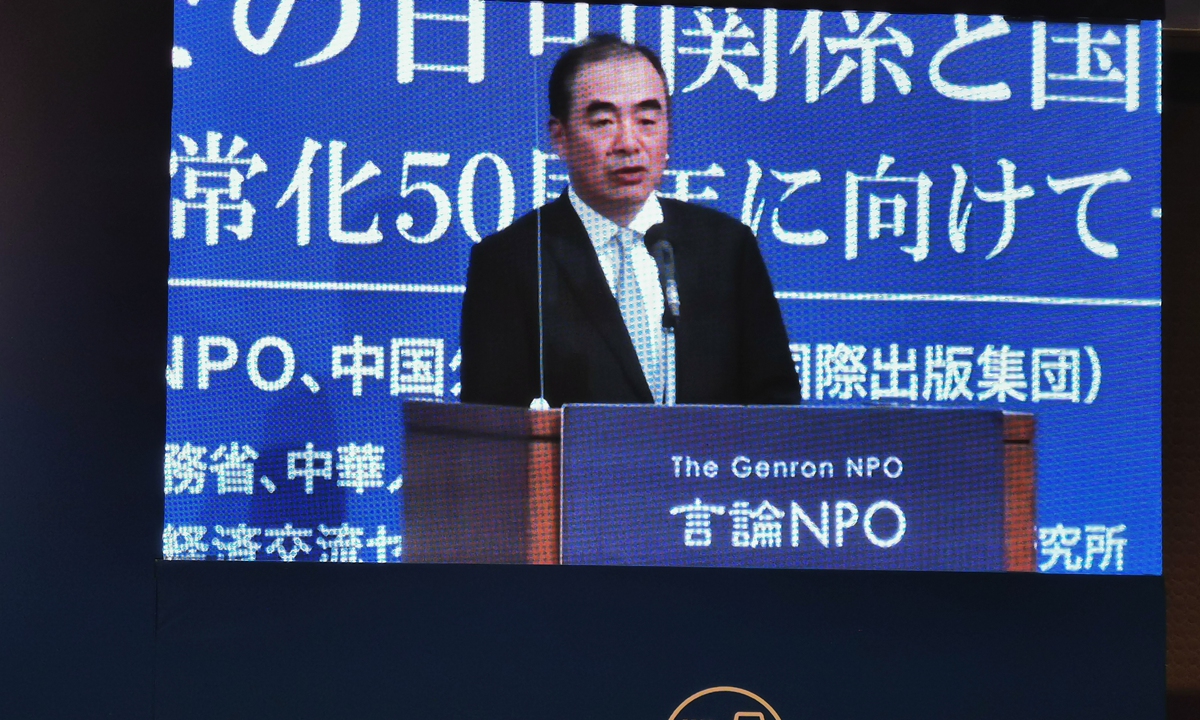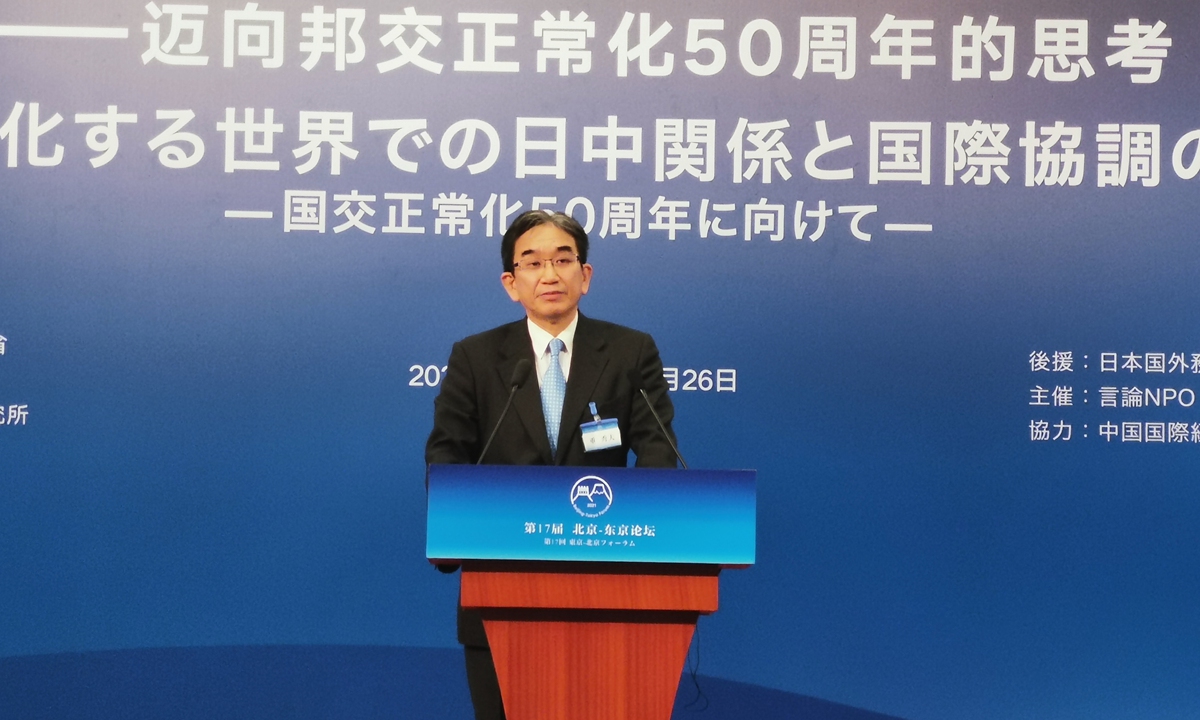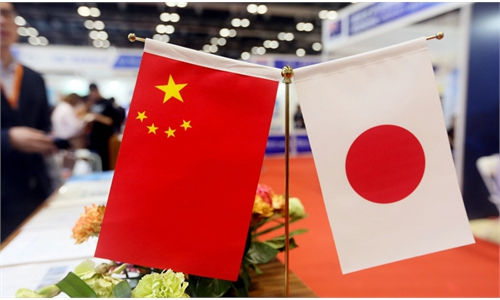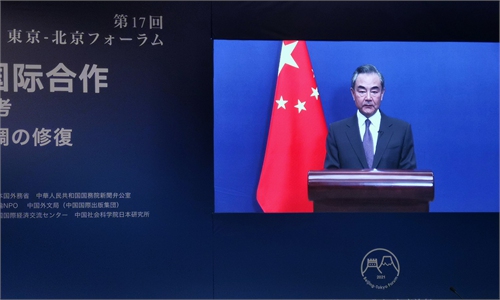
Kong Xuanyou, Chinese Ambassador to Japan Photo: Xu Keyue/GT

Hideo Tarumi, Japanese Ambassador to China Photo: Xu Keyue/GT
As the 17th Annual Beijing-Tokyo Forum concluded on Tuesday, nearly 100 guests reached six areas of consensus on improving China-Japan ties, including resuming and enhancing government and people-to-people exchanges at various levels to promote mutual understanding, as bilateral relations have been through a rocky period.
Ambassadors from the two countries made speeches at the forum on Tuesday, raising several suggestions on improving bilateral ties.
The first area of consensus was to maintain the sound and steady development of China-Japan relations while the situation in Asia and the world is undergoing profound changes. This is not only because the two economies and industries are interdependent and share many common interests, but also because healthy bilateral ties will bring benefits to the two peoples and have great impact on peace and stability in Asia.
Several guests told the Global Times at the forum that the two countries should conduct extensive and candid dialogue at both the government and people-to-people levels as soon as possible to promote mutual understanding and discuss the future of bilateral relations.
Second, China and Japan should be committed to maintaining and developing regional peace and prosperity, which should be taken as one of the essentials of bilateral relations.
The two sides should join hands to lead and promote international cooperation in solving global issues, uphold the international order based on international law, and rebuild an open world economy based on common rules.
Third, China and Japan should jointly promote the recovery of the world economy in the post-pandemic era, and work together to build an inclusive and sustainable world economy with coordinated development between people and the environment.
To this end, the two sides should oppose the divergence of the world economy, promote domestic structural reform and strive to form an open economy while playing roles in the Regional Comprehensive Economic Partnership (RCEP).
As China has applied to join the Comprehensive and Progressive Trans-Pacific Partnership (CPTPP), the guests called on Japan to hold a positive attitude toward this.
Fourth, climate change poses an urgent threat to mankind and is a common challenge to both countries. China and Japan should earnestly fulfill their responsibilities and achieve their respective carbon neutrality targets as scheduled. China and Japan should strengthen cooperation, develop low-carbon technologies and utilize digital technologies to achieve their own emissions reductions, while contributing to global emissions reductions through green finance and other measures.
Fifth, to safeguard regional peace and stability, the two countries should properly handle differences, prevent accidental conflicts and adhere to peaceful settlement of disputes while maintaining the political foundation of bilateral relations.
At the same time, the two countries should further enrich and strengthen their crisis management mechanisms including in the areas of maritime and air liaison, build constructive security relations, and conduct consultations on regional security guarantees.
Sixth, they should maintain and strengthen people-to-people exchanges. Due to the COVID-19 pandemic, face-to-face exchanges between the Chinese and Japanese people have decreased, and many dialogue mechanisms are at a standstill.
Kong Xuanyou, Chinese Ambassador to Japan, specified four goals to improve bilateral relations: to build stronger strategic mutual trust, achieve a higher level of mutual benefit and win-win results, build more solid public support by promoting personnel exchanges and interactions, and engage in more constructive multilateralism by promoting regional cooperation, safeguarding the global economic recovery and responding to global challenges.
Hideo Tarumi, Japanese Ambassador to China, noted that "only by learning from the past can we look to the future."
It is easy to blame each other and pass the buck but it will not help develop China-China relations, he said. Looking back at the past 50 years of normalization of diplomatic relations, it was not plain sailing but a bumpy road, he noted.
By quoting data from a recent poll of the public in both countries, he said that more young Japanese people have a favorable view of China than the average.
So "what we need to do now is not to be happy or worried by the statistics on national sentiment, but to look ahead to the post-pandemic era and actively start preparations to restart youth exchanges," he urged.
Chinese guests and organizers of the forum told the Global Times that they took the forum this year as being very important, as exchanges between China and Japan have basically frozen since the outbreak and this annual forum is the only platform for large-scale and high-level exchanges.
Guests from both countries vowed to make preparations to welcome the 50th anniversary of the normalization of China-Japan diplomatic relations in 2022.

Kong Xuanyou, Chinese Ambassador to Japan Photo: Xu Keyue/GT

Hideo Tarumi, Japanese Ambassador to China Photo: Xu Keyue/GT
As the 17th Annual Beijing-Tokyo Forum concluded on Tuesday, nearly 100 guests reached six areas of consensus on improving China-Japan ties, including resuming and enhancing government and people-to-people exchanges at various levels to promote mutual understanding, as bilateral relations have been through a rocky period.
Ambassadors from the two countries made speeches at the forum on Tuesday, raising several suggestions on improving bilateral ties.
The first area of consensus was to maintain the sound and steady development of China-Japan relations while the situation in Asia and the world is undergoing profound changes. This is not only because the two economies and industries are interdependent and share many common interests, but also because healthy bilateral ties will bring benefits to the two peoples and have great impact on peace and stability in Asia.
Several guests told the Global Times at the forum that the two countries should conduct extensive and candid dialogue at both the government and people-to-people levels as soon as possible to promote mutual understanding and discuss the future of bilateral relations.
Second, China and Japan should be committed to maintaining and developing regional peace and prosperity, which should be taken as one of the essentials of bilateral relations.
The two sides should join hands to lead and promote international cooperation in solving global issues, uphold the international order based on international law, and rebuild an open world economy based on common rules.
Third, China and Japan should jointly promote the recovery of the world economy in the post-pandemic era, and work together to build an inclusive and sustainable world economy with coordinated development between people and the environment.
To this end, the two sides should oppose the divergence of the world economy, promote domestic structural reform and strive to form an open economy while playing roles in the Regional Comprehensive Economic Partnership (RCEP).
As China has applied to join the Comprehensive and Progressive Trans-Pacific Partnership (CPTPP), the guests called on Japan to hold a positive attitude toward this.
Fourth, climate change poses an urgent threat to mankind and is a common challenge to both countries. China and Japan should earnestly fulfill their responsibilities and achieve their respective carbon neutrality targets as scheduled. China and Japan should strengthen cooperation, develop low-carbon technologies and utilize digital technologies to achieve their own emissions reductions, while contributing to global emissions reductions through green finance and other measures.
Fifth, to safeguard regional peace and stability, the two countries should properly handle differences, prevent accidental conflicts and adhere to peaceful settlement of disputes while maintaining the political foundation of bilateral relations.
At the same time, the two countries should further enrich and strengthen their crisis management mechanisms including in the areas of maritime and air liaison, build constructive security relations, and conduct consultations on regional security guarantees.
Sixth, they should maintain and strengthen people-to-people exchanges. Due to the COVID-19 pandemic, face-to-face exchanges between the Chinese and Japanese people have decreased, and many dialogue mechanisms are at a standstill.
Kong Xuanyou, Chinese Ambassador to Japan, specified four goals to improve bilateral relations: to build stronger strategic mutual trust, achieve a higher level of mutual benefit and win-win results, build more solid public support by promoting personnel exchanges and interactions, and engage in more constructive multilateralism by promoting regional cooperation, safeguarding the global economic recovery and responding to global challenges.
Hideo Tarumi, Japanese Ambassador to China, noted that "only by learning from the past can we look to the future."
It is easy to blame each other and pass the buck but it will not help develop China-China relations, he said. Looking back at the past 50 years of normalization of diplomatic relations, it was not plain sailing but a bumpy road, he noted.
By quoting data from a recent poll of the public in both countries, he said that more young Japanese people have a favorable view of China than the average.
So "what we need to do now is not to be happy or worried by the statistics on national sentiment, but to look ahead to the post-pandemic era and actively start preparations to restart youth exchanges," he urged.
Chinese guests and organizers of the forum told the Global Times that they took the forum this year as being very important, as exchanges between China and Japan have basically frozen since the outbreak and this annual forum is the only platform for large-scale and high-level exchanges.
Guests from both countries vowed to make preparations to welcome the 50th anniversary of the normalization of China-Japan diplomatic relations in 2022.



